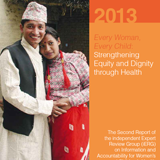
Political momentum for women’s and children’s health has continued to grow at an extraordinary pace during 2012 and 2013. The crystallisation of work around Family Planning 2020, A Promise Renewed, and the Commission on Life-Saving Commodities has added valuable new energy to the UN Secretary- General’s Every Woman, Every Child initiative. The World Bank has become a vocal new supporter for women and children, and the debate on the post- 2015 development agenda has provided a further opportunity to accelerate progress on MDGs 4, 5, and 1c. That said, the proximity of 2015 is a critical transition moment. It is vital that the gains of the past
Although Every Woman, Every Child has increased global advocacy for women’s and children’s health, only 17 of 75 iERG countries are projected to achieve MDG-4 by 2015 (see figure), and only 9 of 75 countries are expected to achieve MDG-5 (see figure).
However, the iERG is concerned that the administrative bureaucracies developing around new global initiatives, such as Family Planning 2020, the Commodities Commission, and A Promise Renewed, are harming coordination in countries, causing duplication of processes, and exacerbating inefficiencies. In sum, we see a troubling gap between the goals of Every Woman, Every Child and the evidence of progress provided to us.